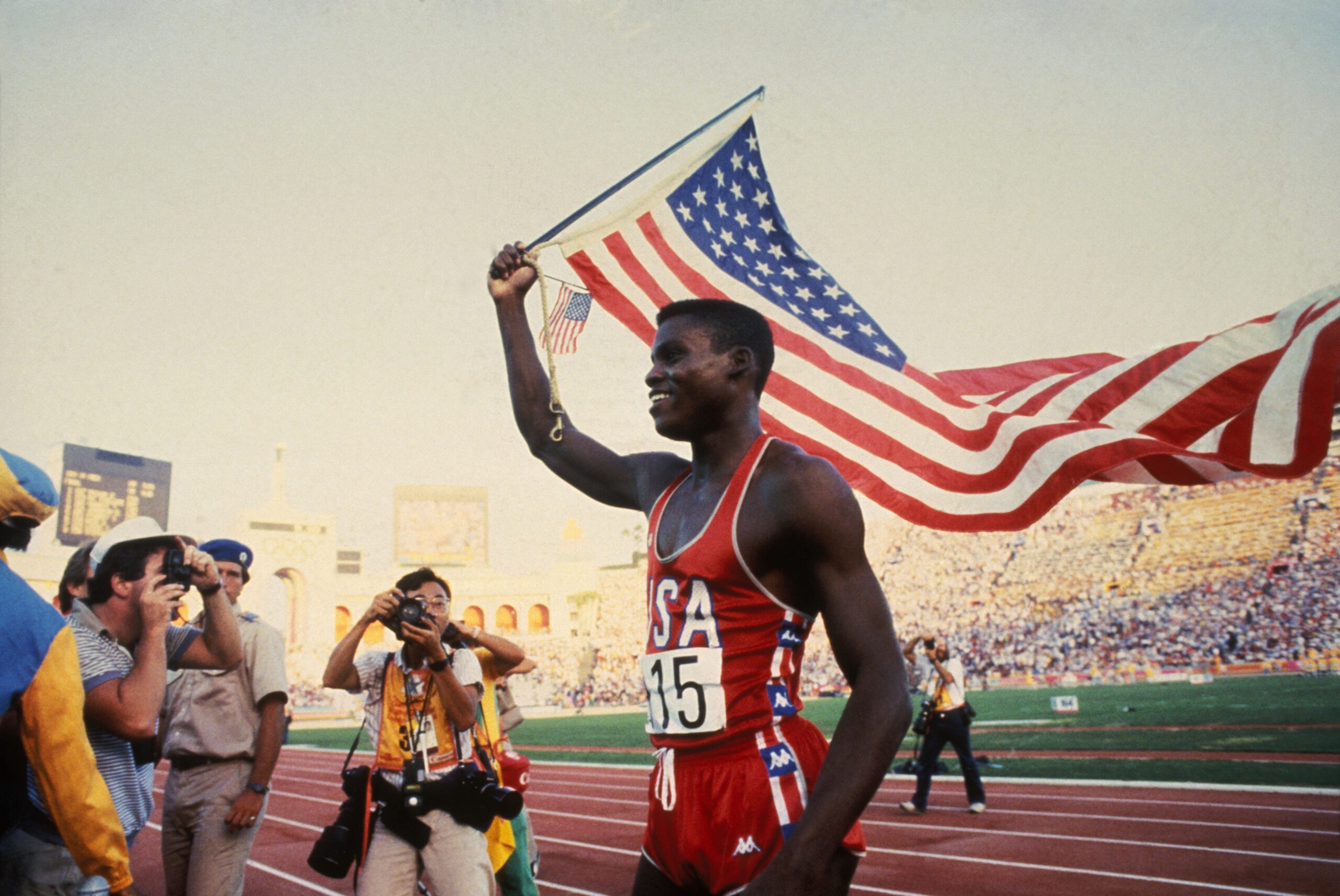LA Should Go for the Gold When It Comes to Electric Transit Buses
With the LA 2028 Olympics looming, LA Metro should keep pace with Olympic cities.
The Olympics are returning to Los Angeles in 2028, and while the city works to rebuild homes lost in the January wildfires and ready itself for the international spotlight, it’s worth considering what’ll be different in the 44 years since the last time Los Angeles hosted the Olympics. In 1984, the LA Olympics were marked by a Cold War Soviet boycott, a modest downtown LA skyline, an obsession with jet packs in the opening ceremony, and smog — so much smog.
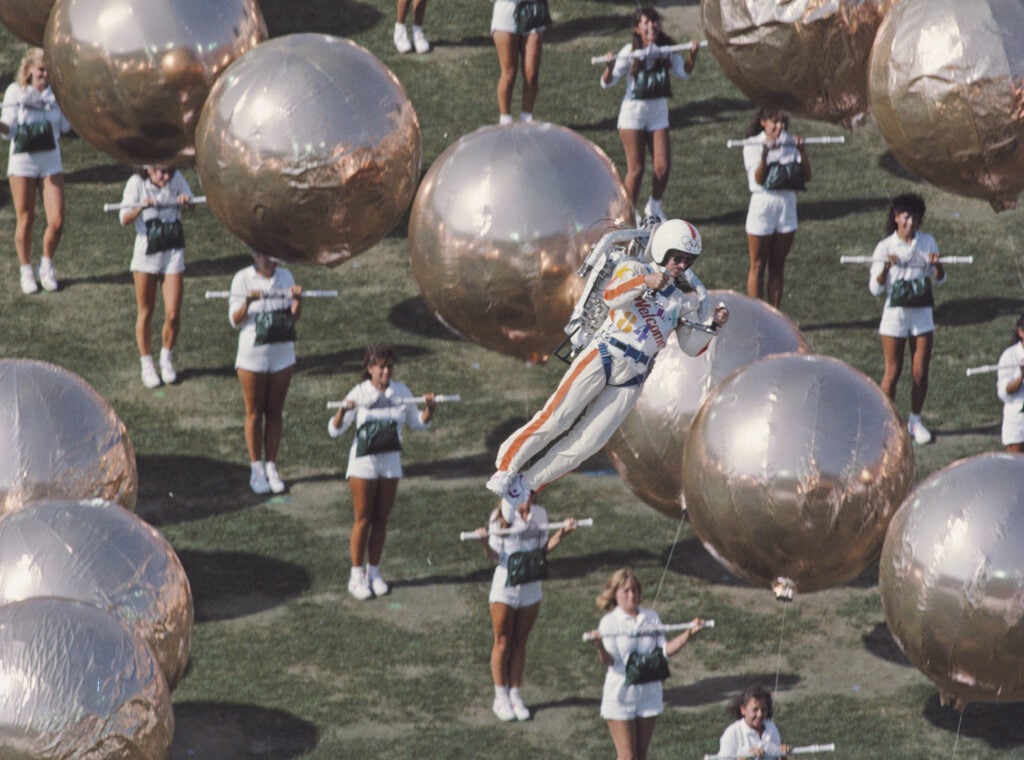
Bill Suitor uses a jetpack to hover over the opening ceremony for the 1984 Olympic Games at the Los Angeles Memorial Coliseum. (Steve Powell / Getty Images)
The women’s marathon made its debut in the 1984 Games, and athletes made their way through 26 grueling miles breathing a smoggy soup. While Los Angeles has since made great wins cleaning our air, every year the American Lung Association hands our region a failing “F” grade, like a disappointed teacher who knows we’re not giving our best.
Two generations later, we’re still the smog capital of the United States.
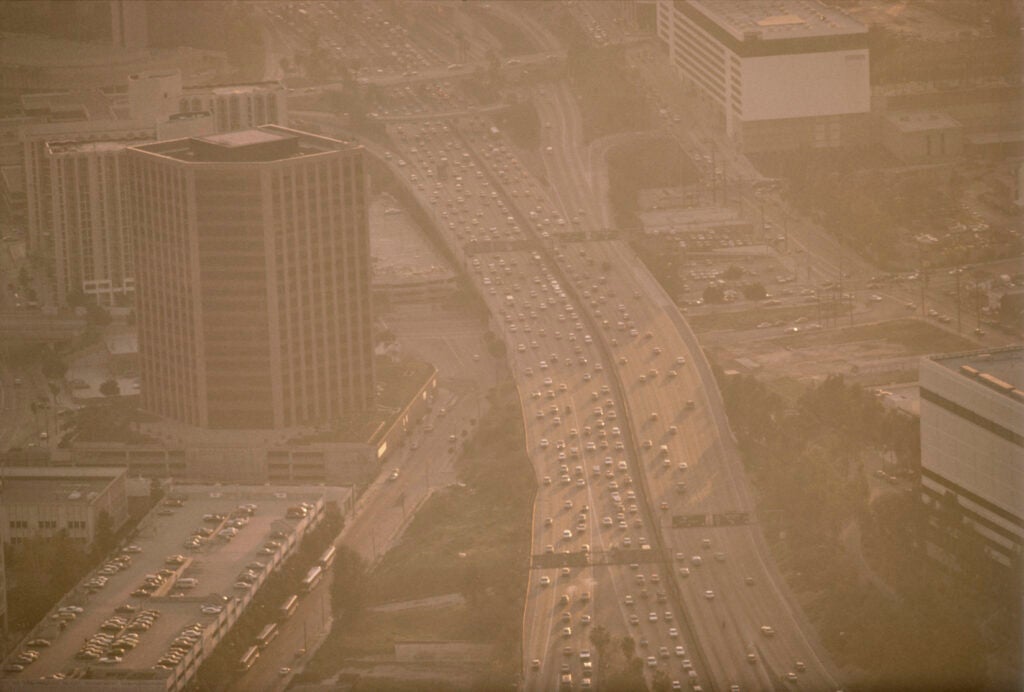
An aerial view of LA’s smoggy air quality in 1985. (Ernst Haas / Getty Images)
There’s one key way Los Angeles can show up well on the international stage come 2028: electric transit buses. Why electric transit buses? They’re better for our health and our climate. Emissions from combustion buses are not only bad for our planet, they’re bad for our lungs. Tailpipe exhaust from buses rolling through communities contributes to air pollution that causes asthma, bronchitis, cancer, and even early death. Public transit riders are especially at risk with this kind of pollution from dated models.
Right now LA Metro has electrified just 3.5% of its bus fleet, so the region has miles to go in making the big shift to modern vehicles. It’s on course to have a mere 12% electrified by the time Los Angeles hosts the 2028 Games.
But LA Metro is an agency that can do big things. In the 1990s, the agency was the first major transit agency in the U.S. to retire all of its diesel buses. It’s the second largest transit agency in the country, and it’s made great strides to help shift car-centric Los Angeles back to public transit.
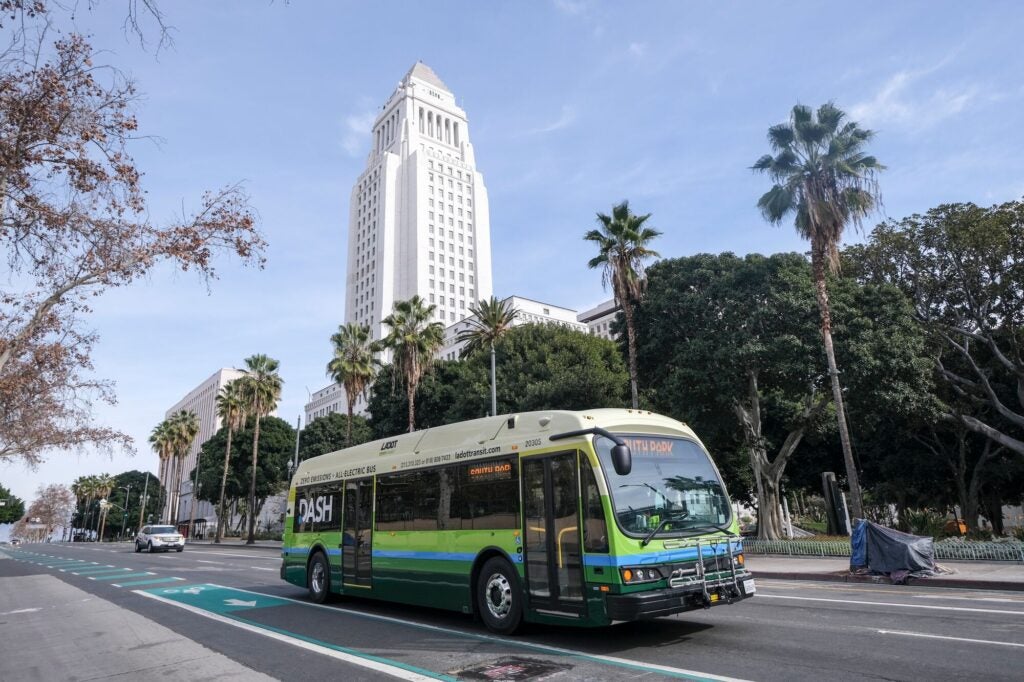
An all-electric bus in Los Angeles, Jan. 12, 2021. (Ringo Chiu via AP)
Consider that all recent Olympic host cities electrified at least half their bus fleets before they hosted the Olympics: Tokyo, Beijing, and Paris. Milan, which will host the 2026 Winter Games next year, is electrifying half their bus fleet. Brisbane is setting an ambitious course for the 2032 Summer Games too. The LA 2028 Olympic and Paralympic Games have committed to being “transit-first” games: imagine if the residents and visitors being ferried to and from events are on modern, quiet, clean electric transit buses.
To keep pace with the rest of the world, LA Metro needs to electrify 1,175 transit buses in its fleet. It can begin to make headway with a bold procurement and charging infrastructure buildout plan this year.
The public health savings from the shift will be significant: LA Metro projects that in Los Angeles County, a transition to a zero-emission bus fleet will deliver $223 million in public health benefits between 2025 and 2050. Not to mention they’re a boon for the local economy: manufacturing electric buses and installing charging infrastructure creates good jobs for working families in the region.
Young Angelenos who dream of being future athletes need clean air. Los Angeles is an exceptionally strong case for the benefits of cleaning its air: when the region engineered a steep decline in air pollution in the mid-1990s, kids’ lung strength grew by over 10% according to extensive research from the University of Southern California. That improved lung strength follows children through the rest of their lives.
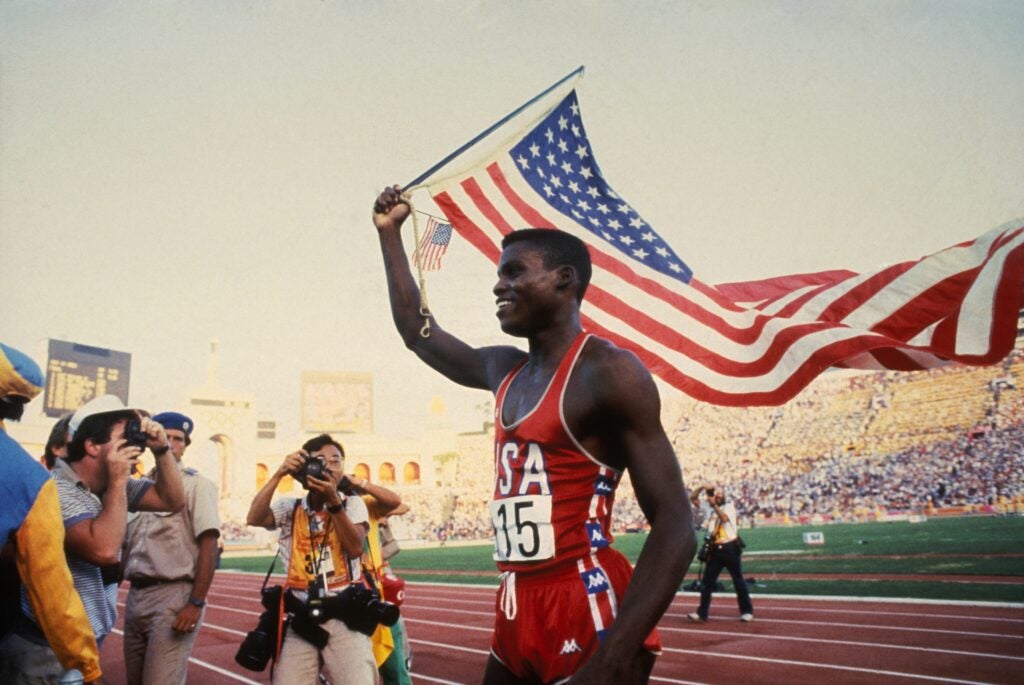
American runner Carl Lewis takes center stage at the 1984 LA Olympics. (Pool PERRIN / TARDY / Gamma-Rapho via Getty Images)
Buses are the people’s vehicle: not everyone can afford a car, but buses grant everyone mobility. They’re often how kids get to school, workers get to their jobs, and the elderly get to medical appointments. Electric buses are quiet, reducing noise impacts in our neighborhoods and delivering better experiences for riders and drivers. Let’s give the people the best ride possible.
Los Angeles deserves a legacy that gives back to the city long after the 2028 Games pass, and we don’t want a stadium: we want a modern transit system. The Olympics should leave a legacy for Angelenos — and nothing would be better than a breath of fresh air and the quiet hum of a modern electric bus fleet.
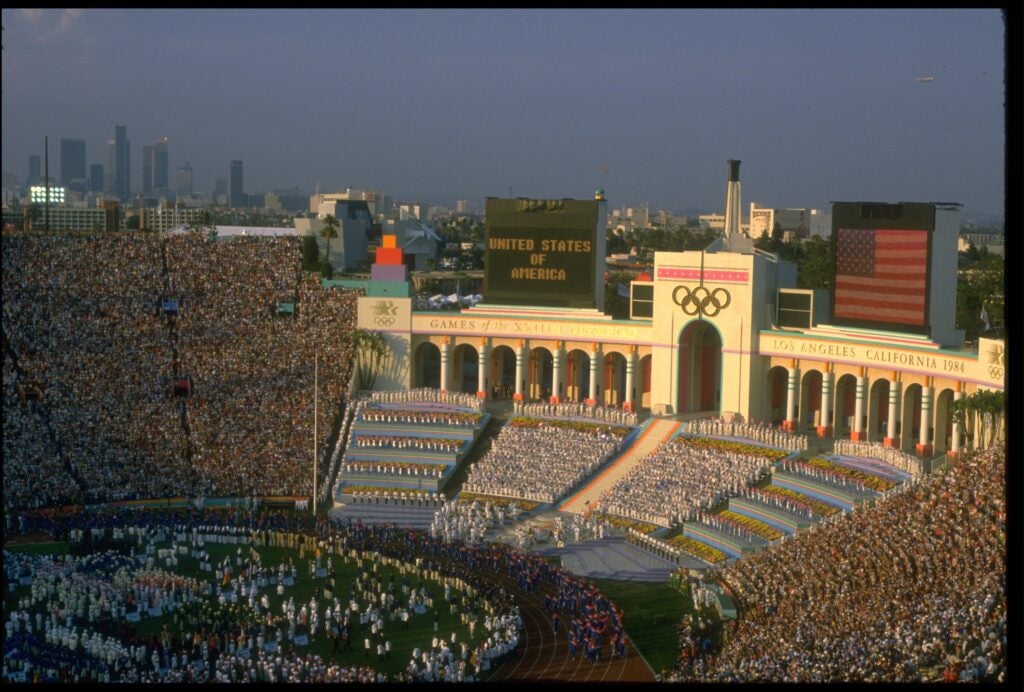
The smoggy opening ceremony for the LA 1984 Olympics. (Steve Powell / Getty Images Sport)
The 1984 Games were the first profitable games in Olympics history. They generated $200 million and heavily relied on existing city infrastructure and facilities. Los Angeles made the games work for Los Angeles, and we can do it again.
The 2028 Games are expected to bring roughly 700,000 additional transit bus riders to the region during the time of year when our air quality is the worst. With less than three years until LA 2028, there’s no time to wait. Los Angeles can go for the gold by building its fleet of electric transit buses. Let’s go!
The California Regional Office fights for the rights of all to a healthy environment regardless of where in the state they live; we fight to protect the magnificent natural spaces and wildlife found in California; and we fight to transition California to a zero-emissions future where cars, trucks, buildings, and power plants run on clean energy, not fossil fuels.
Zoe Woodcraft
Public Affairs and Communications Officer, Earthjustice
zwoodcraft@earthjustice.org
